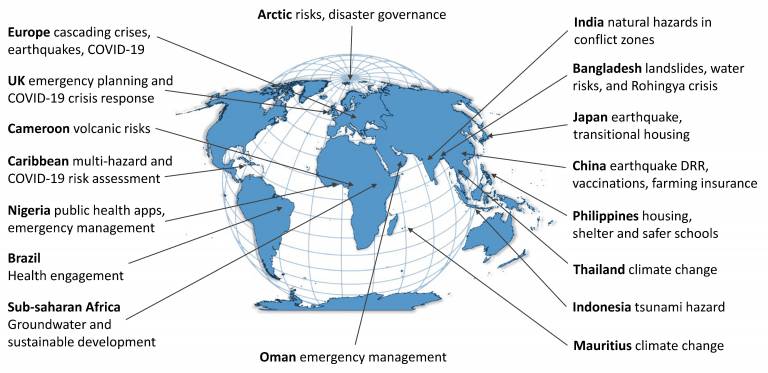The Institute for Risk and Disaster Reduction (IRDR), part of the Faculty of Mathematical and Physical Sciences (MAPS), was launched in 2010 as a Provost Strategic Development initiative with a mission to lead research, knowledge exchange and teaching in risk and disaster reduction (RDR) across UCL. In 2020, the IRDR became UCL’s newest academic department.

Image: IRDR global reach 2022
We aim to develop the IRDR themed around disaster resilience, cascading crises, natural hazards, humanitarian crisis response, health in emergencies, conflict and migration, climate change adaptation, and gender responsive resilience, in order to integrate education, research, innovation and enterprise for the long-term benefit of humanity. The IRDR specifically addresses the vision of UCL in 2034: Addressing Global Challenges; London's Global University; Delivering Global Impact. We aim to impact global humanitarian challenges, to promote education for global citizenship for UCL students, connect the curriculum to humanitarian research and impact national and international policymaking. Expansion of the IRDR is one of the six priority areas in the MAPS Strategic Operating Plan.
The IRDR is strongly interdisciplinary. We currently have 25 academic staff, two of whom are jointly appointed with other departments (Statistical Science and the Institute for Global Health), 11 research staff and 10 members of professional services staff. The IRDR has a PhD population of over 40 and runs three Master's programmes with about 90 students. In 2021, we launched a new undergraduate programme, the Global Humanitarian Studies BSc, which has consistently recruited more than 60 students each year.
We are gaining international, national and London leadership in RDR and humanitarian response, which is illustrated by leading in United Nations forums; the keynote address delivered by the UK Government's Chief Scientist at our Annual Conference; over £8 million in current research funding; active engagement with London First; and training of gold command for London Resilience.
Related Links:
- Find out more in our latest annual reports
 Close
Close

